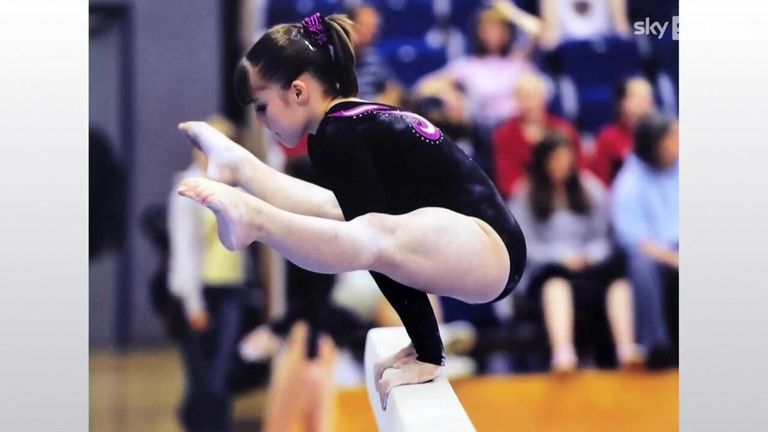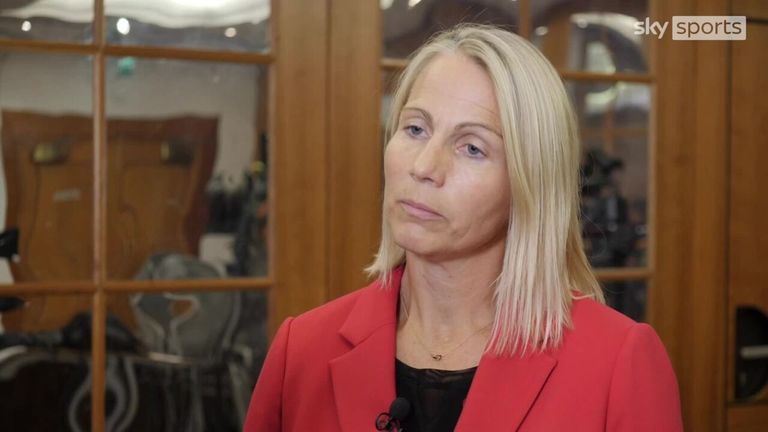British Gymnastics rocked by abuse report | 'Starved, thirsty, body shamed and punished'
The Whyte Review examined over 400 complaints and uncovered an "unacceptable culture" which has left countless young people humiliated, shamed and permanently psychologically or physically damaged by their time in the sport
By Tom Parmenter, Sky News
Last Updated: 17/06/22 10:42am

Young gymnasts were starved and made to hang from the rings in punishment as part of an abusive culture in British Gymnastics.
The Whyte Review, which examined over 400 complaints, uncovered an "unacceptable culture" that has left countless young people humiliated, shamed and permanently psychologically or physically damaged by their time in the sport.
The report found coaches had publicly shamed young girls over their weight - in some instances gymnasts were forced to hang on the rings in the gym for a prolonged period of time for being late.
Another young athlete was forced to balance on the beam for two hours as a punishment.

Youngsters were also prevented from going to the toilet and banned from drinking water during long training sessions.
One gymnast reported being sworn at regularly from the age of nine.
Another said "the coach would shout and scream in our faces so close that I could smell [their] breath and feel [their] spit landing on my face".
Gymnasts were also forced to wear a "dunce's cap" if they could not complete a particular move.
The obsession within the sport over an athlete's weight and appearance was also highlighted as a central problem. "Weight-taking was, at times, accompanied by an uneducated attitude to diet and a humiliating choice of language," the review said.
Whyte Review recommendations
1. Safeguarding and welfare: Reassess the level of responsibility delegated to volunteers in the sport and employ sufficient staff with appropriate professional expertise to support safeguarding of gymnasts; Revise and update its mandatory safeguarding courses to be more relevant to the sport of gymnastics; Improve welfare provision for high performance gymnasts and their parents with a thorough induction process and access to an independent disclosure service and dedicated Welfare Officer.
2. Complaints handling: Ensure is system for complaints is fit for purpose so complaint handling performance is monitored and patterns of behaviour can be identified; Require all clubs to have a complaints policy for safeguarding concerns; Ensure all welfare related complaints about employed coaches are independently investigated.
3. Standards and Education: Appoint a Director of Education to oversee the education and training of coaches; Produce a Gymnast Handbook, to be updated at least every four years, which must include policies with clear guidance on what conduct is and is not acceptable in the sport.
4. Governance and Oversight: British Gymnastics Board is responsible for implementing these recommendations and should publish progress updates at six, 12 and 24 months; Appoint independent Board members with relevant professional expertise in safeguarding and athlete welfare; Introduce pathways to ensure views and interests of athletes and parents, patterns in complaints and performance in complaint handling are known to the Board.
"The tyranny of the scales was coach-led and quite unnecessary.
"Gymnasts took what can only be described as unhealthy steps, such as purging or dehydrating themselves, to keep their weight down in order to satisfy the demands of their coach."
The review was prompted after the Netflix documentary Athlete A revealed allegations of sexual abuse within US gymnastics. While 30 sexual abuse allegations were made as part of the UK investigation the vast majority of complaints focused on physical and emotional abuse.
A culture of silence and a gymnast's reliance on their coaches meant complaints were hard to make - if problems were raised the processes to deal with them often failed.
The sport's governing body, British Gymnastics, was described as an "insular organisation" that was disconnected from the sport, the gymnasts and people involved in the sport.
The review said British Gymnastics "failed to ensure that clubs and coaches, including national coaches, were acting responsibly."
Sarah Powell, who took the job of chief executive of British Gymnastics in 2021, has offered a full apology.
"The practices of the past are not going to be the practices of the future.
"I think this is a watershed moment for safeguarding not just in gymnastics but in all sports.
"This is a genuine apology…we have to set a new path, gymnastics will be different because of the bravery of those who have spoken up."
She vowed to try and rid the sport of abusive coaches but conceded some are still working within the sport.

Anne Whyte QC included pointed criticism at politicians over the lack of independent oversight in sport.
"One wonders how many sporting scandals it will take before the government of the day appreciates it needs to take more action to protect children who participate in sport, a sector where coaches do not have a central regulator and where most complaints lack independent resolution.
"An ombudsman is an obvious step in the right direction."
In a joint statement, UK Sport and Sport England said: "The gymnasts' experiences shared in this Review are harrowing and distressing to read. No one in sport should ever be subjected to such abuse.
"The assurance systems in place clearly did not identify, until relatively recently, long-standing cultural problems in gymnastics, and for this we are sorry.
"British Gymnastics clearly fell short…we believe that withdrawing funding would not only prevent them from implementing the vital changes outlined in the report but also negatively impact on the support to and wellbeing of gymnasts now."
Parmenter: Whyte Review findings are staggering
Tom Parmenter, speaking live on Sky Sports News, has said this must be the moment that gymnastics changes for good.
"The majority of the people involved here are children at the heart of British Gymnastics who have been failed for so long.
"What today is about, is about a vindication of those athletes and families who have decided to come forward and share those accounts on behalf of the wider gymnastics community across the United Kingdom.
"Not everyone involved in the sport has been involved in this culture, but the culture has been allowed to fester in which coaches, some at least, have been able to push young people beyond their limits, in ways which are quite staggering, when you see them written down in this review in black and white.
"The emotional distress and toll that this has taken on so many former gymnasts is quite staggering.
"We've been speaking to some who say they were forced to continue to compete or train through serious injury. One woman, who is now 26, was told when she was 10, she was told to carry on training even though she had fractured her spine.
"There is just a complete emotional disconnect with some coaches, it seems, that has been allowed to become part of the culture of pushing youngsters as hard as they can to be successful within gymnastics, with very little thought or appreciation of the damage that has been done to those young people.
"British Gymnastics have come out with a full apology. The new chief executive, who only came into post last year, said this is something they fully recognise has been completely unacceptable and they offer a full apology.
"They say that this has to be the moment that this sport changes, permanently, because what has happened in the past, simply can't be part of the future."
Vote of confidence for British Gymnastics leadership
The new leadership of British Gymnastics has been given a vote of confidence by the sport's international federation despite the damning findings published in the Whyte Review.
Anne Whyte QC drew on over 400 testimonies to reveal shocking instances of abuse and systemic failures of governance in the sport in the UK, centred around the organisation's prioritising of cash and success over athlete welfare.
The national governing body's new chief executive Sarah Powell issued an apology on Thursday and the global federation, the FIG, is satisfied by what it has seen so far on its efforts to reform the sport.
"The FIG will take the time to carefully read the independent report on the abuses committed in British Gymnastics over the past decade," a federation spokesperson said.
"The first extracts show unacceptable practices leading to the spread of a toxic culture in gymnastics in the country. The FIG is convinced that the new management of British Gymnastics has begun to put in place the reforms needed to ensure that athlete welfare comes first in all cases, as is clearly required by the new Code of Conduct recently adopted by the FIG.
"In recent years, the FIG has worked on several initiatives to raise awareness of youth protection and encourage its national member federations to adopt best practices, notably with 'The 10 Golden Rules of Gymnastics campaign."'
The FIG declined to comment on a specific call in the review for it to raise
the minimum age to enter senior women's competition from 16 to 18.
Whyte wrote that making this change would "reduce the disproportionate training pressures on young girls".
She said she had raised this with the FIG and had been unpersuaded by its approach to the issue.
Whyte wrote that until the change was made, "female gymnasts will always be exposed to earlier and greater risks than male gymnasts".
For anyone who has been affected by the findings detailed by the Review, a free, confidential NSPCC hotline has now been set up on 0800 587 6696.



